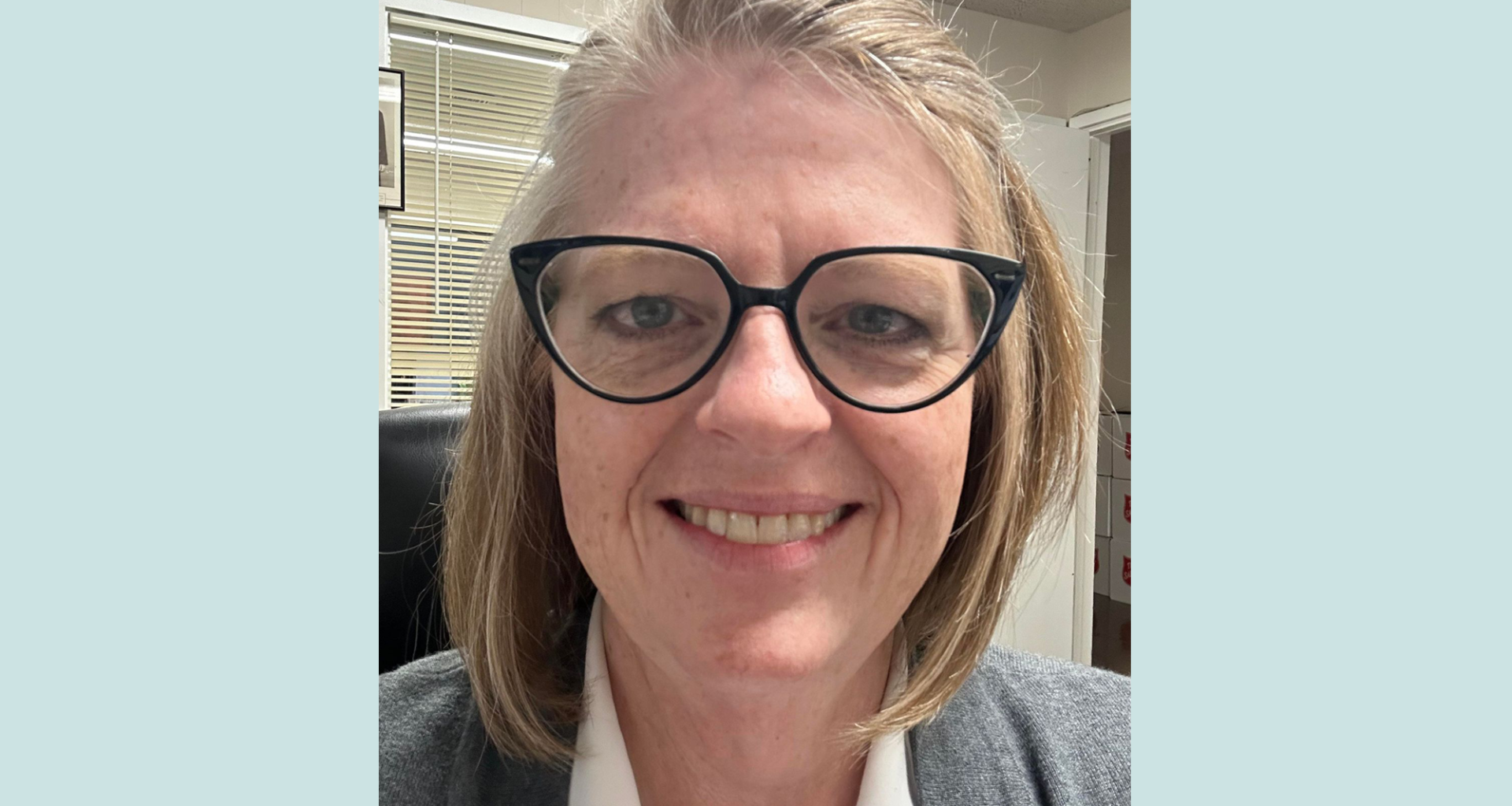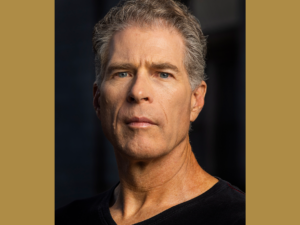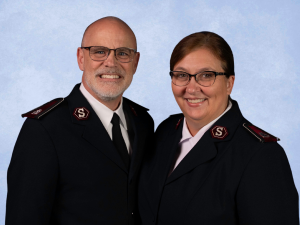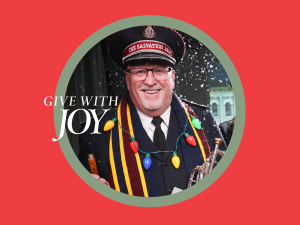Every disaster scenario creates its own unique circumstances and special needs. In each case, The Salvation Army is there with other agencies to offer relief in the form of food services, emergency communications, donations management, social services and more.
Perhaps most uniquely, The Salvation Army deploys specially trained individuals to offer emotional and spiritual care to rescue workers and disaster survivors alike.
That ministry of presence is all we do and say—a collective action of words, touch, listening and presence. Collectively, those actions work together to express the love and compassion of God.
Major Tammy Ray, who currently serves as the corps officer in Redding, California, has a long history of responding to disasters as part of The Salvation Army’s disaster relief team. And she helps prepare people to serve in this emotional and spiritual care role—to discern and offer what someone might need, even if they can’t state for themselves—to create the “transforming place.”
As she says, It’s more being than doing.
It’s a quiet servanthood, a calm presence.
It’s not about fixing but it is a gift of connection with another person at a critical time in their life.
It might be exactly what St. Francis of Assisi meant when he said, “Preach the gospel at all times, and if necessary, use words.”
Show highlights include:
- The Salvation Army officers are disaster responders and are responsible for the communities they live in.
- Emotional and spiritual care is an integral part of The Salvation Army’s disaster response.
- A good emotional and spiritual care provider is someone who genuinely cares about others and is selfless.
- Being present and offering support without trying to fix everything is important in emotional and spiritual care.
- Disasters are chaotic and stressful, and emotional and spiritual care is crucial in helping people cope.
- The Salvation Army’s work in disaster response is motivated by their faith and the desire to serve others.
- Providing ministry of presence to friends and loved ones in personal disasters can make a big impact.
Listen and subscribe to the Do Gooders Podcast now. Below is a transcript of the episode, edited for readability. For more information on the people and ideas in the episode, see the links at the bottom of this post.
* * *
Christin Thieme: Well, Major Ray, thank you so much for joining us on the Do Gooders Podcast today. Welcome.
Major Tammy Ray: Thank you for inviting me to be here.
Christin Thieme: Yes, definitely. Thank you for coming. What was the first disaster response that you ever worked?
Major Tammy Ray: I think I have to say I was about 10 or 11. I’m a Salvation Army officer’s kid, so when disasters happened in my parents’ appointments, it was all hands on deck. So I remember going with my dad to Loveland, Colorado in the aftermath of the Big Thompson Flood where a big huge wall of water came down this canyon from Estes Park into Loveland. And my dad set us up in the canteen by the police department, and we just distributed drinks and sandwiches. And so that’s what I remember, just being there with my mom and dad. So this has been a lifelong passion for me, I guess you could say.
Christin Thieme: Yeah. You had an early joining of the effort. And just, I know, like you said, it’s been a lifelong passion, what are some of the disasters that you’ve been deployed to with the Salvation Army since? Can you give us a little picture?
Major Tammy Ray: Since I’ve been an officer, I was deployed to the Arizona Rodeo-Chediski Fires, well, a big portion of Arizona tried to burn down, and then I was deployed to 9/11. So I was one of the first Western Territory officers that was deployed. And I took care of the credentialing for people to go into Ground Zero. And I think that I arrived in September 27th, I think is what it was.
So I was there in the transition between those first responders and the next wave. And so then I’ve also been part of the response to a tornado that was in our community in one of the towns that we lived in New Mexico. And then I did multiple hurricanes in Florida and I worked at National Headquarters on the Haiti earthquake response. And I think that there were a couple of other hurricanes that I dealt with. And then the most recent was the big fires that happened a couple of summers ago in New Mexico. That brings me to now.
Christin Thieme: And I understand there’s a specific position that you often serve in, the finance and admin chief, for good reason.
Major Tammy Ray: I do. Because I’m not a camping girl. I’m not a rough-it person. And so usually if I’m the one that’s setting up the hotels or the accommodations, so there’s a pretty good chance that I will have flushing toilets and be sleeping inside without the bugs.
Christin Thieme: See, so anybody can help in disaster response.
Major Tammy Ray: That’s right. That’s right.
Christin Thieme: Well, for context, for anybody listening who might not be as familiar, can you give us a little picture as to how does The Salvation Army respond to disaster?
Major Tammy Ray: Well, every Salvation Army officer really is a disaster responder because we are responsible for the communities that we live in. And when a disaster comes into our communities, we’re the first ones on the ground to do the job that needs to be taken care of. So that’s typically what happens. And so if something happens in our own community that we need to respond to, we’re the first line of defense.
Then if we become overwhelmed because it’s a bigger response, then we are in touch with divisional headquarters to help us support that. If it’s bigger than just our division and what we can handle, then it goes to Territorial and then it can bump up to National depending on what the situation is. So we respond locally first and then we’re invited. For me, as an emergency disaster officer, I would be invited to deploy to support other communities.
Christin Thieme: And we are known for providing for those physical needs, right? In the aftermath. I mean you’ve seen, I’m sure pictures of people with cups of coffee and water bottles and the canteens and so forth.
Major Tammy Ray: Yes.
Christin Thieme: But a big and kind of unique aspect of The Salvation Army’s ministry in this realm is emotional and spiritual care or what we often call the ministry of presence. And at times people think the primary goal of a response is to provide for those physical needs and material goods, which of course are essential. But often an overlooked component is those who are obviously struggling with the emotional response to what just happened. So can you share more about what is this role and why is an area of ministry that you are drawn to?
Major Tammy Ray: I think that the uniqueness of The Salvation Army is first and foremost, we do everything that we do as a service to our Lord and Savior. If it wasn’t for what God did for us, we wouldn’t care about other people. So it is an essential part of who we are as officers and members of The Salvation Army. That is what we do. We care about other people. And so that’s why it’s just caring about other people’s emotional and spiritual well-being is just an integral part of who we are.
So that’s why we are a little different than other agencies that respond is because it’s part of who we are, caring about other people and really helping them walk through tragic situations and being in the ministry of presence. It’s just sometimes, and a lot of times in a disaster, all we’re doing is standing there holding their hand and saying, “You’re not in this alone.”
And every part of an emergency disaster response, everybody who deploys, who helps with emergency disasters, we are all responsible for taking care of each other and people who come to us. So it is a unique part of who we are, of our response, but it’s an absolutely, I guess, normal part of our response. That’s who we are. So I don’t know if I answered that correctly.
Christin Thieme: No, definitely. I mean, you don’t always think about that. Standing there and saying, “You’re not in this alone,” I mean, that’s powerful. Having never lived through a giant disaster thankfully, I imagine that that really means a lot to people in situations. I know this role is not just limited to officers, those who are in full-time ministry as pastors with The Salvation Army. It also includes staff and volunteers. So what makes a good emotional and spiritual care provider?
Major Tammy Ray: Somebody who really cares about other people. Honestly, that’s the basics of being an emotional spiritual care provider, is just caring about other people, making sure that we realize that our response in disasters is not about what feeds us, but we are there to support what the people, the survivors, need. And so somebody who is really selfless, really cares about others and not to elevate themselves, that makes the perfect emotional, spiritual care person. So anyone can do it. Anyone can do it.
Christin Thieme: And I know this is something that you train people in of how to do this well, because just being there is a skill.
Major Tammy Ray: It is. As people, we want to make things better. And sometimes the hardest part in walking with people through tragedy is that we can’t fix it. And no amount of words that we say, no amount of physical support that we’re going to give them. We cannot make it better.
All we can do is just stand there and be there with them, walk with them through the tragedy, cry when we need to cry, support, be their strength when they just can’t stand up anymore, we’re the ones that they’re hanging onto. And we can do all of that without words. And that’s the hard part, because I’m a fixer and I’m a talker, and I want to make it better, but sometimes I just have to realize that I can’t.
Christin Thieme: Yeah, that tension is hard. So somebody who was assigned to this role in a disaster response, what exactly would they do? Can you give some examples of what would their assignment be? What are you looking for? What are you doing when you’re on the ground?
Major Tammy Ray: Well, honestly, somebody who is in an emotional spiritual care position, they can do several different things. They can be serving food on the canteens, they can be being in the donations management place as survivors are coming through and receiving donations, goods, clothing, whatever they need, water, food, whatever.
So a lot of times those positions could be just support positions, but the main purpose of why they’re there is to bring that emotional spiritual support to people wherever they’re coming to us from. So it could even, I’ve seen emotional spiritual support people actually walking up and down neighborhoods as they’re cleaning out and sifting through fire stuff that happened here in Reading where I’m appointed to.
Five years ago, we had the car fire, which came through a big portion of our community. And so emotional spiritual care people were just walking in the neighborhood just with wagons of water or snacks and just being there as people are going through and seeing their properties for the first time.
So it can be a gamut of response. So somebody may be deployed as an emotional spiritual care person, but they’re going to be supporting the food service. They’re going to be supporting the sheltering. They’re going to be supporting the donations management because that’s where people are. That’s where the people who need us the most are going to be.
Christin Thieme: And as you’re carrying out those roles, I mean, maybe you’re in charge of handing out water from the canteen. What are you looking for of people who need that extra level of support or care? Are there signs of that? I mean, what are you looking for to bring that element of presence?
Major Tammy Ray: Well, there are a lot of different signs that we can tell. If there’s a family that is really struggling with an emotional trauma, people who have those vacant stares and they just don’t even know what to do. We see that sometimes when people walk into the disaster assistance centers, which typically those ramp up where multiple agencies and groups that have something to offer people who have suffered a disaster, that’s where they set up. And it’s like a one-stop shopping.
And so sometimes what we see is people walking in and you have the deer in the headlights look, and they don’t even know where to start. They don’t know how to speak. And so that’s a prime opportunity for somebody who is doing emotional spiritual care to just go over and say, “Hey, you look a little lost. What can we do for you? Can I help you figure this all out?” And sometimes we see people just having meltdowns, and first of all, we have to make sure that we’re safe, that we’re not putting ourselves in a harmful situation because there’s a lot of emotions that happen in disasters. And so we just need to make sure that we’re not putting ourselves in harm’s way first. However, if there’s somebody that’s having a meltdown, crying, just I guess throwing a fit, yelling, just being careful as we approach, but just say, “Hey, what can we do for you? It seems like you were having a rough day.”
It’s important to keep your voice a little lower, not to react to the emotion of the moment and approach carefully. So those are some of the things, parents who are just snapping at their kiddos, how can we just kind of intervene a little bit so that we can make things a little easier? And so that’s basically what it is just keeping our eyes open to see where we can relieve stress. And so that’s it.
Christin Thieme: Disasters are by nature, chaotic and disruptive and stressful, confusing. So I imagine the emotions run very high.
Major Tammy Ray: They do.
Christin Thieme: You have served in several national disaster responses, you mentioned after Hurricane Katrina, even internationally after the Haiti earthquake. And you said after 9/11, what were, I mean, 9/11 is one of those ones that everybody remembers where they were, what they were doing. It’s just one of those moments. So what were those days like for you when you got to that response had been a couple weeks, I guess at that point. What were those days like in the heart of the aftermath for you in that experience?
Major Tammy Ray: My husband and I, when 9/11 happened, were stationed Sierra Vista, Arizona, which is where Fort Huachuca is, and that’s a big intelligence base. And so we were surrounded, our neighbors were all military. Our next door neighbor, I sat with her as she watched the news because her dad and stepmom worked at the Pentagon, and so she couldn’t get a hold of them, obviously. And so just sitting with them, that was my first response. But when I was asked to go to Manhattan, there’s a lot of things that go through our minds in situations like that. We didn’t know how bad things were going to be. We didn’t know if this was an isolated day and this was going to be it.
And I was preparing myself to get on an airplane that had only been allowed to be in the air again for I think three days at that point. So I remember I sat down and I wrote my children a letter saying if anything happened to me, I wanted you to know how much I loved all of you. So I wrote them a letter. I still have it. It’s still sealed. And just preparing myself for facing whatever was going to come to me, I didn’t know at that point exactly where they were going to place me to help. And I offered to do whatever they asked me to do. And so even if that meant going to the morgue, I was willing to do that. And I was grateful that I didn’t, but I was tasked with helping to transition from a small little conference room at divisional headquarters at the command center into a much larger place because it was going to be an ongoing significant response.
So preparing myself for that is just making sure that I knew that my family was okay. That was an important part. We were three hours ahead from Arizona at the time that that happened. So as I was going back to my hotel room, the children were already in bed, and I was able to talk with my husband and pray with him. And then in the morning, my parents who were early risers, I mean it all worked out. So they called and we prayed together so that I was able to face whatever came at me. So it’s always a challenge. It’s important to stay healthy when you’re deploying. Sometimes that’s not easy. We’ve worked too hard and we don’t pay attention to our own needs.
Christin Thieme: Especially in stressful situations. So in all the responses that you’ve been part of, what have you learned about The Salvation Army and about yourself in these experiences?
Major Tammy Ray: Oh, that’s a great question. I guess what I’ve learned about The Salvation Army, it’s what I’ve always really known, that we will do the best we can with the resources that we have. I just am grateful for the confidence that The Salvation Army has in me to be the representative and to help other people come alongside or that we can go alongside of in order to walk through tough things.
I think what I’ve learned about myself is I think that when I first started to do disaster services, and I first kind of went into the roles that I typically do in finance admin, I think I surprised myself that that was a niche that really worked for me because I was much more, I thought, I was much more of the emotional spiritual care, the social worker part. But what I found about myself in the role that I typically do is there was a huge ministry that I had to other personnel who were being deployed. So often I became the voice of reason on the other end of the phone when things were really not okay.
I remember some phone calls that I had from folks who were in Ground Zero and they were just needing to say, “Hey, I just witnessed this. I just need to tell somebody about it.” And so they were able to talk to me about that. And so what I’ve learned about myself and about disasters and my role in it is that while we are there to support the survivors of the disaster, sometimes the bigger need for me is to support others who are working as hard as I am in whatever role that they’re deployed to, whether it’s the incident commander or whatever. So it’s been more of an internal support that I really enjoyed doing.
Christin Thieme: And that’s an important one too, supporting the supporters so that it can continue. I love that. Is there any specific instance, a conversation, some example from any of your deployments, that has maybe stayed with you of perhaps an example of why you do this work?
Major Tammy Ray: So many. A couple is, two summers ago when I had deployed to New Mexico to support the work that we were doing for the fires, the survivors of the fires. Because my family spent a significant amount of time in New Mexico when I was growing up. I graduated from Farmington, New Mexico High School. I felt like I was in my home state. And I remember having some conversations with some of the people who lost everything. And these were generational ranches, so homes that their great-great-grandparents had built, and they were uninsurable because they were adobe.
Christin Thieme: Oh wow.
Major Tammy Ray: And so just being able to listen to some of those conversations and even praying for them, saying, “There’s nothing I can do to make this better, and I’m so sorry about that, but I can pray for you.” And at that point, I was doing the disaster social services, “So here’s the gift card that I can give you, but more importantly, just know that we’re here. We’ll do the best we can with what we have.”
So some of those conversations stood out to me when we were in Clovis, New Mexico, we had a tornado come through, and the tornado really, it killed two people in our own community. And I remember in a town meeting being there representing the Salvation Army, and I said, “The best thing that I can tell you is I live in this town and I’m here. I’m not going anywhere. I may not be able to fix everything, but I’m walking with you because this is my community that believe in.” And I think that that was really profound for me as well as it was for other people in our community at that time.
Christin Thieme: Yeah, I imagine you get a lot of those big questions. I mean, naturally it’s what you think following a disaster. Why did this happen to me? Why was this allowed to happen? So I’m sure that it’s just that, like you said, making sure they’re not alone and that The Salvation Army is here.
Major Tammy Ray: And admitting that we don’t have the answers. I mean, I may be a Salvation Army officer pastor, but I don’t know why God allowed these things to happen. I wish He didn’t allow them to happen. And I think that the big thing is that we admit that we don’t have all the answers. We don’t know why these things happen. We don’t know why some communities, it seems like that they’re affected time after time by different disasters. I don’t understand why that happens, but I do know that God loves us more than we could ever imagine, and He’s the one that is our sustainer through all of this. And so if I can be His hands and His feet and His voice, then that’s what I need to be.
Christin Thieme: We mentioned you train others to respond with The Salvation Army in this capacity generally for large-scale disasters and responses, but each of us encounter people who are in the midst of some personal disaster all the time. When you think about the work that you do on this larger scale, is there some sort of tool or guidance that you would give to someone who might be the ministry of presence for a friend or a loved one in their own life?
Major Tammy Ray: Yes. Less words, just be. Less words. Don’t try to fix. Don’t try to say, “Hey, I understand what you feel.” We don’t understand. So being a quiet presence is important, just being there. Offering practical support. You need some. “When was the last time you ate today?” Just being very, less words. I think that that’s the biggest thing is for the ministry of presence. That’s not the time to tell people all about Jesus. That’s not the time to tell people what they should do, what they shouldn’t do. Basically that’s the time that we need to just stop and just be, let them speak. And that’s hard for us to do. It’s hard for me to do.
Christin Thieme: Yes. Like you said, just being there is a skill.
Major Tammy Ray: It is, it is. One that I keep learning.
Christin Thieme: That’s right.
Major Tammy Ray: I keep having to practice that because it’s not part of my nature.
Christin Thieme: For any of us, but it makes a big impact.
Major Tammy Ray: Yes.
Christin Thieme: Major, thank you so much for sharing today. Thank you for giving us some insight into this really important and powerful work The Salvation Army does following a disaster and how we might even be able to implement a little bit of it in our own lives. Thank you.
Major Tammy Ray: Yes, it was my pleasure. Thank you for having me. I appreciate it very much.
Additional resources:
- See how The Salvation Army fights disaster.
- Have you ever found yourself wanting to volunteer but unsure of what to do or how to go about it? Here’s the key: You can make an impact for good with whatever time and skills you have. Whatever your interest, there is a you-sized need for goodness in the world. Get the guide on How To Be An Impactful Volunteer with nine habits to make a difference when giving back.
Listen and subscribe to the Do Gooders Podcast now.












